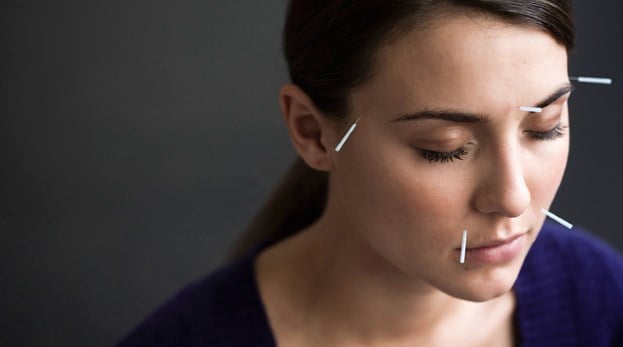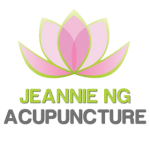
This article originally appeared in everyday HEALTH® | Image Emely/Corbis
Why Acupuncture Works for Anxiety Relief
By Maura Hohman Reviewed by Lindsey Marcellin, MD, MPH
Not just for pain, acupuncture is a natural way to treat anxiety. It works faster than therapy and keeps you drug-free.
Research shows that acupuncture for anxiety is effective.
You might think acupuncture is for hipsters who don’t believe in Western medicine or for your aging parent with chronic back pain, but a growing body of research shows that acupuncture can help treat a condition that affects everyone from time to time: anxiety.
Managing severe anxiety can be tricky because it generally includes therapy, which might not provide results for months, according to the Anxiety and Depression Association of America. What’s more, it can require anxiety medication, which can have serious side effects, says Ladan Eshkevari, PhD, CRNA, LAc, a certified acupuncturist, a physiologist, and the assistant director of the Nurse Anesthesia Program at the School of Nursing & Health Studies at Georgetown University in Washington, D.C. Yet when acupuncture for anxiety is effective, symptoms lessen after the first few visits, and practitioners like Eshkevari are confident it attacks the problem at its roots.
How Acupuncture for Anxiety Works
Ancient Chinese medicine describes an energy force called Qi that regulates the body’s overall health, according to University of Chicago Medicine. Like blood in the circulatory system, Qi moves throughout the body via pathways called meridians. When factors like injury, stress, poor nutrition, or a change in environment disrupt the flow of Qi, health issues follow, according to the University of Miami Health System. By inserting needles at specific points in the body, acupuncturists restore the balance of Qi and the body’s overall health, University of Chicago Medicine reports.
This concept might seem outdated to some, but Daniel Hsu, DAOM (Doctor of Acupuncture and Oriental Medicine), LAc, a practitioner at New York AcuHealth Acupuncture in New York City, says Qi is just a metaphor for metabolic function, or the chemical reactions constantly taking place in the body.
Acupuncturists insert each needle half a millimeter away from a nerve, Dr. Hsu explains. Depending on where the needles go, acupuncture can cause the nervous system to produce painkilling chemicals, jump-start the body’s natural ability to heal itself, or stimulate the part of the brain that controls emotions, including anxiety. All of these results, Hsu adds, can help people feel more balanced and treat a variety of illnesses.
The Mechanics of Acupuncture for Anxiety Management
Hsu says acupuncture has increased in popularity since the 1970s simply because it works, and now there’s growing research supporting its effectiveness for anxiety and other mental conditions.
For instance, in a study published online in October 2013 in the Journal of Acupuncture and Meridian Studies, students who underwent a 20-minute acupuncture session were found to have less anxiety and better memory immediately afterward than those who didn’t have acupuncture.
Why does it work? Eshkevari explains that external circumstances beyond your control can set off your anxiety and that acupuncture allows your body to take back control.
“We’re constantly under stress and pressure to perform, which can bring on disease and other serious health issues,” Hsu says. “Acupuncture is great for maintenance. It helps a long life become a better-quality life.”
How does it work? Led by Eshkevari, researchers at Georgetown University used lab studies to demonstrate that acupuncture slows the body’s production of stress hormones. Their findings were published in the April 2013 issue of the Journal of Endocrinology.
Few procedures work 100 percent of the time. That includes acupuncture, but it does have benefits that conventional treatments like psychotherapy and medication do not, Eshkevari says. She explains that side effects, such as bruising and dizziness, are minimal and uncommon, whereas some prescription drugs can have serious side effects and can lead to dependency.
Unlike with counseling, people treated with acupuncture often see results after one session, and the results improve with continued treatment. Hsu says acupuncture is particularly helpful for people who want to limit or stop drug use — prescription or otherwise. Because it regulates the body’s chemical balance naturally, acupuncture can even prevent people from needing medication at all, he says.
Getting Started With Acupuncture
When it comes to trying acupuncture, you have nothing to lose, Hsu says. With a certified acupuncturist, the risks are almost nonexistent and are far outweighed by the potential benefits. The majority of Eshkevari’s patients have told her they sleep better and have a stronger sense of overall well-being after just a few sessions.
If you’re already receiving treatment for anxiety, Eshkevari suggests adding acupuncture to your current regimen. If you decide it works for you, you can work with your doctor to wean off anxiety medication. First, though, contact your insurance provider to find out whether it covers any acupuncturists in your area. Then talk with a practitioner — ask questions and openly discuss a potential treatment plan.
This article originally appeared in everyday HEALTH®
About Jeannie Ng, L.Ac., M.A.O.M


